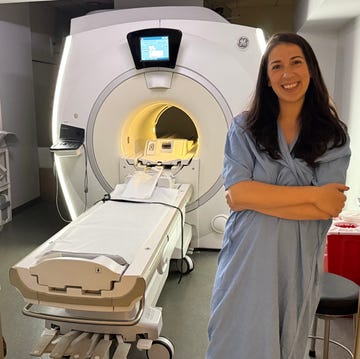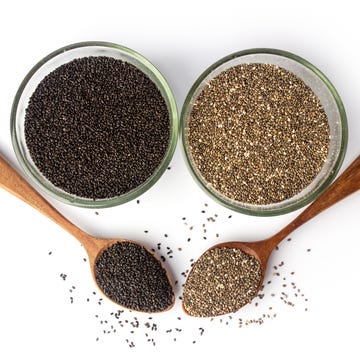Wrapped in a fuzzy white blanket in an all-white upstairs room at the New York Historical Society, Chrissy Teigen looks every bit the multitasking mom she is—grounded, open, and still catching her breath from the emotional rollercoaster of the past year. The author, entrepreneur, and mom of four, says she always keeps comfort items like this blanket nearby. It’s a small but meaningful form of self-care she can take with her anywhere.
That sense of grounding has become more important than ever. After her youngest son, Miles, 6, was diagnosed with type 1 diabetes (T1D) last year, Chrissy found herself navigating entirely new territory—managing daily care, emotional highs and lows, and a constant stream of information. Still, caring for others has always come naturally to her. “I get a lot out of it,” she tells Women’s Health after speaking on a Women’s Health Lab panel about the experience. “It’s a form of self-care for me, too.”
Chrissy has been candid about how shocking—and yes, frustrating—Miles’ diagnosis has been for her and her family. “I remember being really surprised, but I still had no idea the kind of change it would bring to our family,” she says. “The shock kind of came in later.”
Miles’ journey began after he contracted the bacterial infection shigella during football camp. His symptoms were more severe than most other kids’, and it was clear something wasn’t right. “His pain was incredible, and he's a pretty tough little boy,” Chrissy previously shared with People.
What followed was a whirlwind of hospital visits and countless blood tests. Eventually, doctors diagnosed Miles with type 1 diabetes—despite the fact that he hadn’t shown typical symptoms of the condition. “We were thrown into this world of chaos and had to learn so much all at once,” Chrissy says. "Everything was put on pause. We were finding ourselves going in and out of hospitals, sitting down with our notebooks taking copious notes and taking videos of everything someone was doing with the insulin jar.”
Now that her family has had time to better understand and manage the diagnosis, Chrissy says she’s still grappling with one key frustration: Why wasn’t she, or the rest of her family, encouraged to get screened for type 1 diabetes earlier?
“It was so wild to me,” she says. “It seemed like such a simple segue. Like, okay, Miles has it—well, then your whole family should get screened, right?”
But that conversation never happened. Early screening was never brought up during any of Chrissy’s pregnancies, either. (Chrissy and husband John Legend share four children, the youngest born via surrogate in June 2023.)
“In a world where we're getting tested for everything—where there are so many different types of screenings—I'm doing blood tests pretty much every time I go to the gynecologist or any doctor,” she says. “So the fact that I’ve been doing these so often and haven’t been screened for type 1 this whole time is frustrating.”
As a paid spokesperson for Sanofi, Chrissy is determined to raise awareness about screening and early detection. “I actually didn’t even know this kind of screening existed until I was approached by Sanofi to work with them,” she admits. “It was news to me.” Chrissy wants to empower parents to ask questions, to get screened, and to give themselves the best chance to prepare—before a diagnosis flips everything upside down.
Adapting To Their New Normal
Behind the scenes of their very public lives, Chrissy and John have been quietly learning and supporting each other through this new chapter, often in real time.
“John travels a lot, and our family… We’re surrounded by amazing caretakers,” Chrissy says. “Miles has a great diabetes team. He has wonderful nurses at his school. But you need to learn so much, and you're constantly learning new things.”
She emphasizes that they’re still in their first year of navigating the diagnosis, and nothing is quite set in stone yet. “We’re still finding what works best for him, what he prefers—because you want to give him some agency and autonomy over his body, right? Like, it’s his body that all this is happening to. So we are constantly, just always ready for things to change.”
For Chrissy, creating a sustainable support system has been crucial—not just for Miles, but for the entire family. That includes mental health resources, which help them process everything that comes with the emotional side of chronic illness.
“I have really good people around,” she says. “We have counselors as a family who sometimes talk to Miles, sometimes talk to John, sometimes talk to both of us—about how we can be better with Miles, or how we can approach certain topics with him.”
Right now, Chrissy admits, they’re facing a tough stretch. “He’s taking off his [monitoring] devices every day. It’s really hard,” she says. “But I feel good about where I’m at mentally. I feel like I’m in a strong period in my life to be able to take on something like this.”
That strength, she says, is rooted in the deep love she has for her family—and the belief that advocacy begins at home. “It’s so important to advocate for yourself and your family. You can be thrown into a crazy storm of chaos, or you can have some time to prepare. And I wish we had some time.”
When One Family Member Has Type 1, Everyone Adjusts
As the family has settled into new routines, Chrissy has seen just how deeply a diagnosis like Miles’ can ripple through the household.
“Yes, there are so many changes our family has made and had to make—and everybody has to adapt,” she says. “The thing about type 1 is that it affects a lot of the family members.”
That includes Miles' older sister, Luna. “She’s got big feelings about it, too,” Chrissy says. “She’s having feelings of jealousy. Miles has been getting a lot of attention. But she’s still so sweet and kind, and she doesn’t want to react this way. But she’s 9, so it’s going to happen.”
Chrissy also recognizes that as a mom, it took time to admit she also has tough moments. “You kind of don’t want anyone to know that you’re maybe learning and struggling a bit, because at the end of the day, you’re not the person it’s happening to.”
Rather than brushing it under the rug, Chrissy leans into the discomfort with compassion. “It’s difficult, but I pull myself together to be able to rally and take care of the family, because that’s just what we do.”
Relying On Community
For Chrissy, one of the most unexpected sources of support has been the online type 1 diabetes community—a group of parents, caregivers, and individuals living with the condition who’ve shown up for her in some pretty remarkable ways.
“The T1D community is so strong,” she says. “They’ve been so helpful with all of my pressing questions—whether they’re big or small, emotional or not. Every time I’ve asked for help, they’ve just really come through. It’s been really beautiful … Just a different part of social media to see. It's a community rooted in so much heart.”
Recently, Chrissy turned to her followers for advice about Miles’ sensitive skin. “He’s always had really sensitive skin—when he and Luna were babies, they both had terrible eczema,” she shares. “Now, with all the devices he wears, it’s been rough. He’s so thin—just this little beanpole of a kid with these long, lanky arms—and he’s incredibly physical. He’s playing football, baseball, basketball … wrestling, sliding everywhere. So his devices don’t stay on easily, and we’re having to replace them a lot. His poor skin is just going through it.”
When she asked the community for help, the response was immediate—and overwhelming in the best way.
“It was like everyone had congregated on the answer before I even asked,” she says, laughing. “I had thousands of responses within the first hour. Everyone had something thoughtful to share—what worked for them, what didn’t, what to try, what to avoid. I couldn’t believe it.”
And the support doesn’t end online. “If I’m out—at the airport or on a plane—people will come up to me and just offer tips. Like, ‘Oh, if you ever need this...’ and show me something that worked for them. It’s so sweet. It’s just awesome. Truly, the greatest community.”
Still, Chrissy knows that there is still more ahead on the journey.
“I hope that one day I’ll be able to give people advice,” she says. “But for now, I’m still learning everything right along with Miles. Like I said, we don’t want him to know that—but I’m still secretly reading all the books. And a lot of them are for children,” she adds with a smile.
Through it all, Chrissy says her definition of strength has evolved—and continues to shift. “Strength is kind of ever-evolving for me and for our family,” she says. “Sometimes it’s being able to push through a really hard week that Miles is dealing with. Sometimes it’s just being able to ask for help, or say, ‘Hey, I’m not okay today.’ And other times, it’s adapting on the fly, learning something new, and getting ready for whatever’s next.”
Visit screenfortype1.com for resources and more information on how and why to screen for type 1 diabetes.














